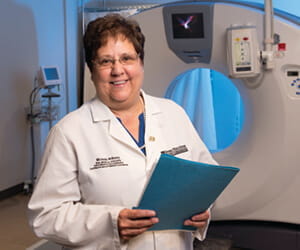
One year ago, the American Cancer Society estimated that there would be more than 230,000 new cases of lung cancer diagnosed in the U.S. in 2018. Due to the efforts of Dr. M. Michele Williams ’16, a Doctor of Nursing Practice (DNP) graduate, several of these cases may have been detected early enough for lifesaving treatment.
Williams, an oncology and palliative care nurse practitioner at University of Maryland (UM) Shore Regional Health, worked with members of the UM Community Medical Group Pulmonary Care team to create and implement a lung cancer screening program at the hospital in July 2017.
Within a year, she screened 211 patients, of which there was at least one confirmed case and more than 40 with positive results to necessitate further screening. Williams’ program aims to detect lung cancer at its earliest, most treatable stages using low-dose computed tomography (CT) imaging for high-risk patients.
“Lung cancer is typically detected at Stage 3 or 4 because patients often don’t show symptoms until that point,” Williams says. “Usually by then, surgery is no longer an option. With our program, we can detect cancer at Stage 1 and remove it before it gets worse.”
Located on Maryland’s Eastern Shore, UM Shore Regional Health provides a broad array of inpatient and outpatient healthcare services to a five-county region that includes several rural at-risk communities with sizable smoker populations. Patients with significant smoking histories are recommended for the screening program and receive a CT scan. If the results of the scan show any nodules that could be cancerous, Williams will order a follow-up test. If cancer is detected, she will work closely with the patient’s medical provider to determine a course of treatment.
To alleviate patient stress throughout the process, Williams engages in what she calls a “shared decision-making” conversation where she guides patients through the steps of the program and counsels them on developing and maintaining healthy habits.
“When people hear the word ‘cancer,’ they immediately get anxious,” Williams says. “I try to put them at ease and explain everything in great detail. I see their facial expressions change when I tell them I will deliver their results within a day after the scan. The great thing about this program is that patients aren’t waiting and agonizing for weeks.”
Providing top-quality patient care has always been Williams’ passion, which is why she decided to pursue her DNP at Walden. Inspired by the university’s focus on social change and a desire to make an impact on her community, Williams laid out the foundation for the screening program in her final project under the instruction of Dr. Eileen Fowles. This involved creating an educational program about palliative care for nurses and developing a process for assessing patient pain thresholds.
“My DNP gave me the academic resources and skills needed to bring this screening program to life,” Williams says. “Without it, I wouldn’t have had the confidence to implement something of this caliber.”
In recognition of the impact she’s had on her community through this work, Williams received the Martin D. Abeloff Award for Excellence in Public Health and Cancer Control from the Maryland Department of Health Center for Cancer Prevention and Control in November 2017. The award honors Abeloff, a renowned medical oncologist and researcher who passed away from leukemia in 2007.
In addition to her work at UM Shore Regional Health, Williams is an associate medical director for Talbot Hospice and holds a variety of volunteer leadership positions nationally and statewide. In October 2018, she began teaching online graduate courses as an adjunct professor for Wilmington University.
“Walden inspired me to pursue teaching and continue to grow myself professionally,” Williams says. “I can’t wait to see where this path takes me.”



